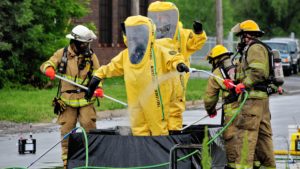
FEMA’s Center for Domestic Preparedness will hold the final pilot of its four-day Disaster Related Exposure Assessment and Monitoring (DREAM) course later this month.
DREAM will train responders from state, local, tribal and territorial agencies to assess, monitor and track health effects to emergency responders and community members before, during and after incidents involving chemical, biological or radiological materials.
During the course, responders will hone their skills using epidemiologic software which combines Emergency Responder Health Monitoring and Surveillance, Assessment of Chemical Exposure, and Epi CASE (Case Assessment Symptom and Exposure) tools developed by the Centers for Disease Control and Prevention’s Agency for Toxic Substances and Disease Registry (ATSDR) and National Institute for Occupational Safety and Health (NIOSH). The course will conclude with a capstone exercise.
Development of the DREAM course began in 2019 and is a collaboration between the CDP, the ATSDR and NIOSH. Representatives from the CDC organizations will participate in the pilot course as students and provide feedback and recommended changes.
The DREAM course is expected to be ready for implementation later this year. Its target audience will cover a wide swath of responders – from public health and healthcare providers to those in the fire and emergency services and non-governmental organizations which assist in response and recovery operations.
